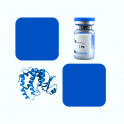
- Remove this product from my favorite's list.
- Add this product to my list of favorites.
Products
Newsletter
 |  |  |  |  |  |

Background
Cluster of Differentiation 86 (CD86) is also known as B-lymphocyte activation antigen B7-2, is a type I membrane protein that is a member of the immunoglobulin superfamily, and is constitutively expressed on interdigitating dendritic cells, Langerhans cells, peripheral blood dendritic cells, memory B cells, and germinal center B cells. Additionally, B72 is expressed at low levels on monocytes and can be upregulated through interferon γ. CD86 is the ligand for two different proteins on the T cell surface: CD28 (for autoregulation and intercellular association) and CTLA-4 (for attenuation of regulation and cellular disassociation). CD86 works in tandem with CD80 to prime T cells. Recent study has revealed that B7-2 promotes the generation of a mature APC repertoire and promotes APC function and survival. Furthermore, the B7 proteins are also involved in innate immune responses by activating NF-κB-signaling pathway in macrophages. CD86 thus is regarded as a promising candidate for immune therapy. CD86+ macrophages in Hodgkin lymphoma patients are an independent marker for potential nonresponse to firstline-therapy.
Source
Recombinant Biotinylated Human B7-2, Fc,Avitag, premium grade(CD6-H82F5) is expressed from human 293 cells (HEK293). It contains AA Leu 26 - Pro 247 (Accession # P42081).
Predicted N-terminus: Leu 26
It is produced under our rigorous quality control system that incorporates a comprehensive set of tests including sterility and endotoxin tests. Product performance is carefully validated and tested for compatibility for cell culture use or any other applications in the early preclinical stage. When ready to transition into later clinical phases, we also offer a custom GMP protein service that tailors to your needs. We will work with you to customize and develop a GMP-grade product in accordance with your requests that also meets the requirements for raw and ancillary materials use in cell manufacturing of cell-based therapies.
Molecular Characterization
This protein carries a human IgG1 Fc tag at the C-terminus, followed by an Avi tag (Avitag™)
The protein has a calculated MW of 53.8 kDa. The protein migrates as 66-90 kDa under reducing (R) condition, and 130-150 kDa under non-reducing (NR) condition (SDS-PAGE) due to glycosylation.
Biotinylation
Biotinylation of this product is performed using Avitag™ technology. Briefly, the single lysine residue in the Avitag is enzymatically labeled with biotin.
Biotin:Protein Ratio
Passed as determined by the HABA assay / binding ELISA.
Endotoxin
Less than 0.01 EU per μg by the LAL method.
Sterility
The sterility testing was performed by membrane filtration method.
Mycoplasma
Negative.
Purity
>95% as determined by SDS-PAGE.
>90% as determined by SEC-MALS.
Formulation
Lyophilized from 0.22 μm filtered solution in 50 mM Tris, 100 mM Glycine, 25 mM Arginine, 150 mM NaCl, pH7.5 with trehalose as protectant.
Reconstitution
Please see Certificate of Analysis for specific instructions.
For best performance, we strongly recommend you to follow the reconstitution protocol provided in the CoA.
Storage
For long term storage, the product should be stored at lyophilized state at -20°C or lower.
Please avoid repeated freeze-thaw cycles.
This product is stable after storage at:
-20°C to -70°C for 12 months in lyophilized state;
-70°C for 3 months under sterile conditions after reconstitution.
Bioactivity
Please refer to product data sheet.
(1) "Dual Checkpoint Aptamer Immunotherapy: Unveiling Tailored Cancer Treatment Targeting CTLA-4 and NKG2A"
Ayass, Tripathi, Griko et al
Cancers (Basel) (2024) 16 (5)
(2) "Co-stimulatory pathway competitive assay development using Liquid chromatography-tandem mass spectrometry (LC-MS/MS)"
Malkawi, Ohlund, Rahman et al
J Pharm Biomed Anal (2024) 242, 116034
(3) "Immunopotentiating effects of herb-partitioned moxibustion on the spleens of cyclophosphamide-induced immunosuppressed rats"
Xiong, Tian, Xu et al
Chin Med (2024) 19 (1), 28
Showing 1-3 of 4794 papers.
Follow us